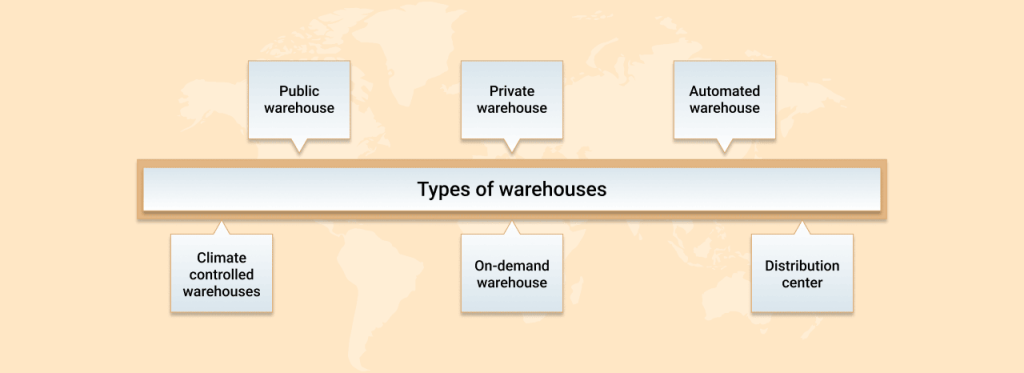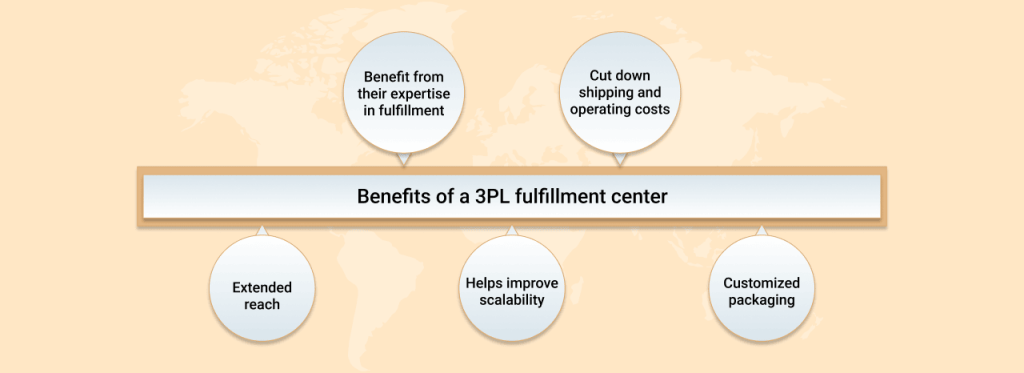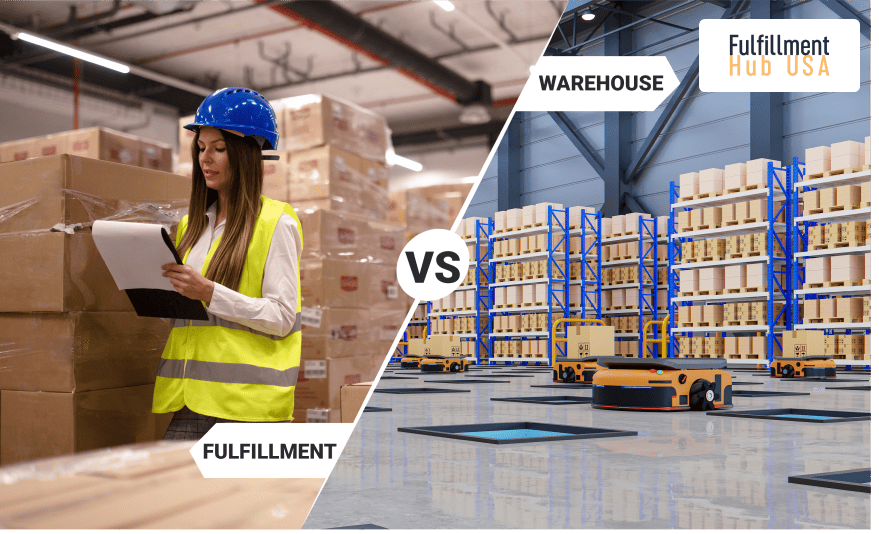What makes e-commerce the best type of business is that it gives its owner freedom from a brick-and-mortar shop. A responsive and pretty-looking website can successfully act as an online store to sell your products. Nevertheless, eCommerce owners are still left with the most important burden to unload – storing inventory!
The most important element of an e-commerce business: Inventory storage
For smaller e-commerce businesses, makeshift places like a home office or garage will suffice to store the products temporarily; however, as time passes and business outgrows your space, you will need a bigger place to store and a bigger team to pack and ship your products.
Owners of e-commerce businesses in the growth stage often find themselves in the dilemma of deciding whether to choose a warehousing solution or a fulfillment solution for managing and storing their inventory. If you, too, are stuck in the dilemma of deciding which one is better for your business, this article will help you understand how a warehouse is different from a fulfillment center.

Warehousing or fulfillment we can offer both! Explore our wide range of services designed for eCommerce businesses.
Table of contents
- The most important element of an e-commerce business: Inventory storage
- What is a warehouse?
- Types of warehouses:
- What are the general characteristics of an ideal warehouse:
- What is a Fulfillment Center?
- How does a fulfillment center work?
- What’s the difference?
- Benefits of a 3PL fulfillment center:
- Bottom Line: Which solution is better for you?
- Avail Fulfillment Hub USA’s Warehousing and Fulfillment Services
- Frequently Asked Questions:
What is a warehouse?
A warehouse is a large building or an industrial space used mainly to store goods that await distribution to their designated destinations. Due to their large sizes, warehouses are typically located on the city’s outskirts, and some are located right at the seaports and airports for easy loading and unloading.
Primary customers for warehouses are B2B businesses and wholesalers since these people deal in large volume of products which, of course, need a huge space to be stored. A typical warehouse consists of shelves and racks with products stored in them. Operations in a warehouse are usually pretty much static, with forklifts moving around goods that shall be used later.
Many e-commerce companies with a high volume of goods moving out every day have their own warehouses. However, renting or leasing a shared warehouse space is much more cost-efficient for small and medium-sized businesses. In addition, warehousing companies often store goods of multiple companies under the same roof as they offer their space for various enterprises.
Types of warehouses:

There are different types of warehouses, depending upon the type of goods you deal with, you can choose the type of warehouse that suits you best.
Public warehouse:
Public warehouses are government-owned buildings that are open for both private business and personal use. Often offered at a lower price, public warehouses are your best option compared to other warehouse types if you are looking to store your goods for a shorter term.
Private warehouse:
This type of warehouse is owned by wholesalers, distributors, manufacturers, or even a warehousing company that offers space for other businesses. Priced slightly higher than a public warehouse, it is suitable for SMB owners planning a long-term strategic presence in a particular region.
Automated warehouse:
An automated warehouse is a warehouse that is equipped with modern technologies like robots, the internet of things, and artificial intelligence to reduce the number of full-time employees and human errors.
Climate-controlled warehouses:
Climate-controlled warehouses are designed to store perishable and temperature-sensitive items like meat, food, ice creams, or dairy items that require refrigeration.
On-demand warehouse:
On-demand warehouses are facilities offered on a temporary basis for businesses that need an ad hoc storage solution for their goods. Billing for the space utilized is generated on a month-to-month basis.
Distribution center:
Distribution centers provide storage facilities to businesses that usually look to distribute their products within a short period of time – a day or two. It receives a large shipment, and the products are quickly distributed within a day.
What are the general characteristics of an ideal warehouse:
As you have read above, there are many warehousing solutions available for storing goods. However, there are some general characteristics you must look out for before signing a deal with them.
- Loaded with safety and security features.
- Easy accessibility and proximity to the market.
- Equipped with the latest mechanical appliances.
- Well-designed interiors.
- Sufficient storage space for storing goods.
- Proper emergency protocol for natural disasters.
What is a Fulfillment Center?
A fulfillment center is a place where goods are processed, packed, and shipped to the end customer and/or retailers, along with storing them.
It is essentially a warehouse, however, the day-to-day operations in a fulfillment center differ from the static operations of a typical warehouse.
It will typically have e-commerce businesses as its clients whose primary customers can be both direct customers (B2C) or other businesses/retailers (B2B). A fulfillment center can handle the packaging and shipping of single item shipments to direct customers as well as large bulk orders to other businesses.
It is also known as a distribution center and third-party logistics (3PL) provider. The primary purpose of a fulfillment center is to manage the seller’s inventory, pack and label items upon receiving orders, and finally ship them to the customer.
How does a fulfillment center work?
The step-by-step operational process of a fulfillment center:
Step 1: Inventory is moved to the fulfillment center.
Step 2: The delivered inventory is sorted and stored by the fulfillment center staff.
Step 3: Orders received from customers are routed to the fulfillment center.
Step 4: It processes and ships the item to the customer’s front door.
Step 5: Fulfillment center processes any returned items.
What’s the difference?
Aesthetically a warehouse and fulfillment center look similar. However, at the crux, the functionalities of a warehouse and fulfillment center vary. A warehouse is simply a large industrial space used to house goods that are to be delivered to retailers/customers later. Whereas a fulfillment center does so much more than just storing inventory.
A fulfillment center can act as a warehouse, although a warehouse cannot act as a fulfillment center. Below are a few attributes related to warehousing and fulfillment centers that prove their difference in nature.
Storage Terms: Long vs. Short
In a warehouse, the inventory is stored for a more extended time. On the other hand, inventory doesn’t last longer than a month in a fulfillment center. Businesses plan their demand beforehand to store just as many inventory levels as they require to avoid the extra expense of storing surplus goods.
Available services
As stated above, a warehouse only provides the space to store your inventory. On the contrary, a 3PL fulfillment center will offer the following services:
- Receiving inventory
- Picking
- Kitting
- Packing boxes
- Labeling
- Shipping orders to customers
- Managing returns
Benefits of a 3PL fulfillment center:

Benefit from their expertise in fulfillment
Fulfillment centers offer their services to multiple clients simultaneously with the capabilities of fulfilling dozens of orders in a day under one roof. Their staff is trained to efficiently complete the fulfillment processes with the necessary mechanical equipment. Setting up your own fulfillment center for your business might turn out to be expensive, considering the dunnage and trained staff required to box your items, which brings us to our next point.
Cut down shipping and operating costs
As mentioned above, fulfillment centers manage the inventory of multiple companies, which allows them to purchase the raw material needed to package an item in bulk at a cheap price. With hundreds of products rolling out every day and having multiple clients; fulfillment center owners can cover the cost of hiring staff.
In addition, storing your products within the distributed network of your fulfillment center allows you to strategically place your products in different locations to cut down shipping costs.
Extended reach
One good thing about an e-commerce business is that the customers are not bound to territorial boundaries. Your online store can potentially attract customers from overseas. And, you can ship your items internationally with the right fulfillment partner with an international network. Also, fulfillment centers are aware of the international rules and regulations for shipping products; they can be a great help if you want to extend the reach of your business.
Helps improve scalability
Fulfilling your items on your own might get overwhelming once the volume of orders increases. Outsourcing your fulfillment to a 3PL provider will help you scale up your business and efficiently manage any surge in orders.
Customized packaging
Delivering your product in a battered brown box held together with duct tape is not cool anymore. Customers tend to create an impression of your brand just by looking at the packaging the product has arrived in. When you outsource fulfillment to a 3PL provider, you will be able to customize shipping boxes and give your product packaging a fresh look and feel.
Bottom Line: Which solution is better for you?
For every e-commerce business storing its products someplace secure is inevitable; therefore, it all boils down to whether you should rent a warehouse or outsource your fulfillment to a 3PL provider.
If your business model is B2B, wherein your primary target audience is other businesses, you will mostly need a warehouse to store your goods for a longer time and sell them later. On the other hand, outsourcing fulfillment and warehousing makes more sense if you are a growing e-commerce business whose target audience is the direct consumer.
Setting up your own fulfillment center to pack and ship your products may sound easy and inexpensive in the beginning when the volume of orders you receive is low. However, once your eCommerce business starts growing, and the demand for your products rises, you will find yourself tangled in the hassle of packaging, shipping, marketing, and branding. That’s a lot of work on individual shoulders.
Avail Fulfillment Hub USA’s Warehousing and Fulfillment Services
We at Fulfillment Hub USA believe in providing the best fulfillment services to our clients. With the help of our trained staff and cutting-edge inventory management technology, we strive to be the best in business.
We can provide both warehousing and fulfillment services to emerging and already established e-commerce businesses.
For businesses seeking a long-term storage solution, you can avail our warehousing services for storing your goods for as long as you want.
And for the businesses emerging into the big league of e-commerce giants, we offer a myriad of fulfillment services. Which will help you get your product to the customer cost-efficiently and quickly.
Fulfillment Hub USA can take care of every process that exists from the time a customer places an order until it gets delivered, be it packaging, kitting, repacking, international shipping, domestic shipping, storing, or returned items management.
Check out Fulfillment Hub USA’s 5 – in – 1 Cloud-based Software solution:
- Inventory management
- Order management
- Shipping management
- Warehouse management
- Integration
Frequently Asked Questions:
What is a warehouse?
A warehouse is an industrial space designed to store goods for a longer time.
What is a fulfillment center?
A fulfillment center is essentially a warehouse but with added features like inventory management, product packaging, shipping, return item management, and much more.
Is a Fulfillment center better than a warehouse?
Yes, a fulfillment center is better than a warehouse considering the long list of services a fulfillment center offers. A warehouse will just store the products for as long as you need.
What services does a fulfillment service offer?
A fulfillment center offers services like receiving inventory, picking, kitting, packing boxes, labeling, shipping orders to customers, managing returned items.

She is an avid reader turned content creator. She has over 4 years of experience in writing B2B and B2C website content, articles, and social media content. She has worked with different types of content; from tweets to full-fledged video scripts and privacy policies. Apart from reading and writing, she connects with plants, travelling, and psychology.
